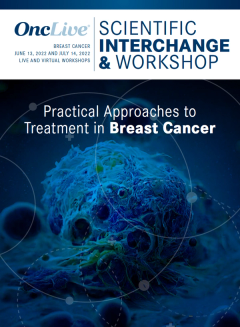
Dr. O’Shaughnessy on Pembrolizumab in Triple-Negative Breast Cancer
Joyce A. O’Shaughnessy, MD, discusses the sequencing of pembrolizumab with chemotherapy in patients with early-stage triple-negative breast cancer.
Joyce A. O’Shaughnessy, MD, co-chair, Breast Cancer Research, chair, Breast Cancer Prevention Research, Baylor-Sammons Cancer Center, The US Oncology Network; member, Scientific Advisory Board, US Oncology Research Network, discusses the sequencing of pembrolizumab (Keytruda) with chemotherapy in patients with early-stage triple-negative breast cancer (TNBC).
Pembrolizumab is currently indicated in patients with stage II or III TNBC and no history of serious autoimmune disorders who will be receiving preoperative chemotherapy, O’Shaughnessy says. For instance, the regimen from the phase 3 KEYNOTE-522 trial (NCT03036488) is preoperative paclitaxel, carboplatin, AC (doxorubicin hydrochloride and cyclophosphamide), and pembrolizumab, followed by surgery and radiation with concurrent pembrolizumab, for a total of 6 months of postoperative pembrolizumab therapy, O’Shaughnessy explains.
For patients with BRCA1 and BRCA2 wild-type disease, several meta-analyses and clinical trials have demonstrated improved survival with 6 months of oral capecitabine (Xeloda) without pembrolizumab, O’Shaughnessy notes. Additionally, a regimen of 6 months of capecitabine plus pembrolizumab is being investigated in patients with residual disease, O’Shaughnessy says. Although level 1 evidence has yet to be determined for the combination compared with either agent alone, the safety data for the combination looks promising, O’Shaughnessy concludes.









































